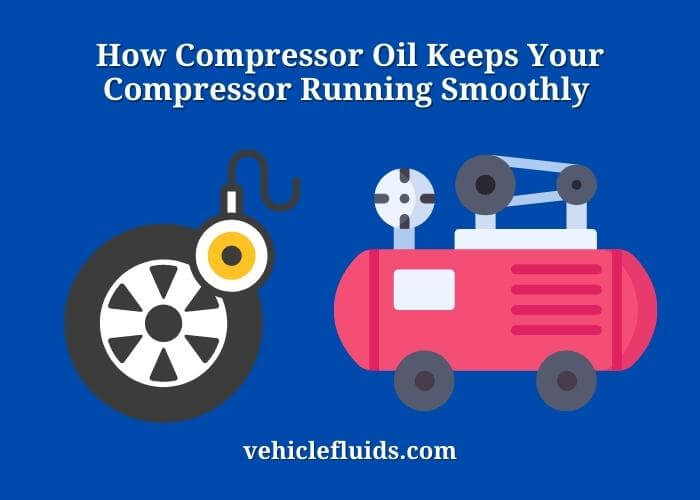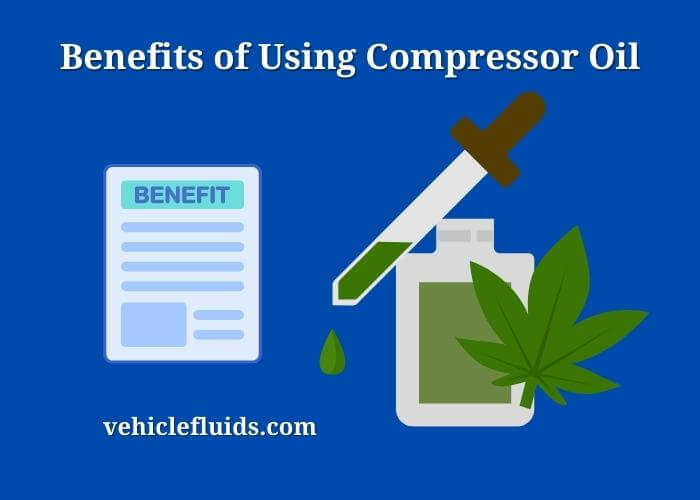Air compressors are used in various industries to power equipment and machinery. These machines require regular maintenance to ensure their longevity and efficient operation. One of the essential components of air compressor maintenance is the use of compressor oil.

Compressor oil lubricates the moving parts of the compressor and helps to dissipate heat generated during operation, preventing breakdowns and extending the lifespan of the machine.
The Role of Compressor Oil
Compressor oil is a specialized lubricant that is specifically designed to reduce friction and wear in air compressors. It plays a critical role in the smooth operation and longevity of the machine. When air compressors operate, the moving parts, such as the pistons, cylinders, and bearings, generate a significant amount of heat and friction. Compressor oil helps to lubricate these moving parts, reducing friction and preventing wear and tear.
In addition to its lubrication properties, compressor oil also helps to dissipate the heat generated during compressor operation. As the compressor pumps air, the temperature of the compressed air increases, which can lead to the overheating of the machine. Compressor oil helps to absorb and dissipate this heat, preventing the compressor from overheating and breaking down.
Using the right type of compressor oil is crucial for the proper operation and longevity of the compressor. The type of oil required depends on the type of compressor, the operating conditions, and the manufacturer’s recommendations. The wrong type of oil can cause damage to the machine, reduce its efficiency, and shorten its lifespan.
The role of compressor oil in air compressor maintenance is vital. Without proper lubrication and heat dissipation, the machine can suffer from increased wear and tear, overheating, and costly breakdowns. Using the right type of compressor oil and maintaining it regularly can help to keep air compressors running smoothly and efficiently for years to come.
Types of Compressor Oil
There are several types of compressor oil available, including mineral-based, synthetic, and semi-synthetic oils. The type of oil required depends on the type of compressor, operating conditions, and manufacturer recommendations.

Mineral-Based Oil
Mineral-based oils are the most common and affordable type of compressor oil. They are made from refined petroleum and have a high viscosity, which makes them suitable for high-temperature applications. Mineral-based oils are generally recommended for reciprocating compressors, which have a high compression ratio and produce a lot of heat.
Synthetic Oils
Synthetic oils (some experts believe that synthetic oil may not be suitable for older cars), on the other hand, are more expensive than mineral-based oils but offer superior performance and longer life. They are made from synthesized chemicals and have a lower viscosity than mineral-based oils, which makes them suitable for low-temperature applications. Synthetic oils are recommended for use in rotary screw compressors, which operate at a lower temperature and require a lubricant with a lower viscosity.
Semi-Synthetic Oils
Semi-synthetic oils are a blend of mineral and synthetic oils and offer a good balance between performance and cost. They have a lower viscosity than mineral-based oils but are more affordable than synthetic oils. Semi-synthetic oils are recommended for use in both reciprocating and rotary screw compressors, depending on the operating conditions.
Choosing the right type of compressor oil is crucial for the proper operation and longevity of the machine. Always refer to the manufacturer’s recommendations and specifications to ensure that you are using the right type of oil for your compressor. Using the wrong type of oil can cause damage to the machine, reduce its efficiency, and shorten its lifespan.
Properties of Compressor Oil
Compressor oil has several properties that make it suitable for use in air compressors. The properties of compressor oil are determined by its composition and are essential in ensuring the proper operation and longevity of the compressor.
Viscosity
Compressor oil must have the right viscosity to provide adequate lubrication and heat dissipation. The viscosity of the oil must be suitable for the operating temperature and conditions of the compressor.
Oxidation Resistance
Compressor oil must have excellent oxidation resistance to prevent it from breaking down over time. The high temperatures and pressures in air compressors can cause the oil to oxidize, leading to the formation of deposits that can clog the compressor and reduce its efficiency.
Anti-Wear Properties
Compressor oil must have anti-wear properties to reduce friction and prevent wear and tear on the moving parts of the compressor. The oil must also provide a protective film over the moving parts to prevent them from coming into direct contact with each other.
Corrosion Resistance
Compressor oil must be resistant to corrosion to prevent the formation of rust and other deposits that can damage the compressor’s internal components.
Foaming Resistance
Compressor oil must be resistant to foaming to prevent air from getting into the oil and reduce its lubricating properties.
Compatibility With Materials
Compressor oil must be compatible with the materials used in the compressor to prevent damage to the machine. The oil must not react with the materials and cause corrosion or other forms of damage.
Compressor oil must have the right viscosity, oxidation resistance, anti-wear properties, corrosion resistance, foaming resistance, and compatibility with materials to ensure the proper operation and longevity of the air compressor. When choosing compressor oil, it is essential to consider these properties and follow the manufacturer’s recommendations to ensure that the oil is suitable for the compressor.
Benefits of Using Compressor Oil
Using compressor oil in air compressors offers several benefits, including:

Reduced Friction
Compressor oil provides lubrication to the moving parts of the compressor, reducing friction and wear and tear. This reduces the maintenance requirements and prolongs the life of the compressor.
Improved Efficiency
Compressor oil reduces the friction and heat generated during compressor operation, improving the efficiency of the machine. A well-lubricated compressor requires less energy to operate and can compress more air, resulting in increased productivity and lower energy costs.
Prevents Overheating
Compressor oil helps to dissipate the heat generated during compressor operation, preventing the compressor from overheating and breaking down.
Corrosion Prevention
Compressor oil contains additives that prevent the formation of rust and other deposits, protecting the compressor’s internal components from corrosion and other forms of damage.
Enhanced Performance
Using the right type of compressor oil can enhance the performance of the compressor, resulting in smoother operation, reduced noise, and longer life.
Lower Maintenance Costs
Regularly changing the compressor oil can reduce maintenance costs by preventing damage to the compressor’s internal components and reducing the risk of breakdowns.
Using compressor oil is essential for the proper operation and longevity of air compressors. It provides lubrication, reduces friction, dissipates heat, prevents corrosion, enhances performance, and reduces maintenance costs. It is crucial to choose the right type of oil and maintain it regularly to ensure that the compressor runs smoothly and efficiently.
Choosing the Right Compressor Oil
Choosing the right compressor oil for your compressor is crucial for its performance and longevity. The type of compressor, operating conditions, and manufacturer recommendations should all be considered when selecting the oil. Always refer to the manufacturer’s recommendations and specifications to ensure that you are using the right type of oil.
Maintaining Your Compressor Oil
Maintaining the compressor oil is crucial to ensure the proper operation and longevity of the air compressor. Regular maintenance and proper care can prevent damage to the compressor and reduce the risk of breakdowns. Here are some tips for maintaining your compressor oil:
Check the Oil Level
Check the oil level regularly and top it up if necessary. Cold weather can be a real drag on vehicles, and checking your car’s oil is one of the most important maintenance tasks you need to do regularly. Ensure that the oil level is always between the minimum and maximum marks on the dipstick.
Change the Oil
Change the compressor oil according to the manufacturer’s recommendations. The frequency of oil changes depends on the type of oil, compressor type, and operating conditions.
Use the Right Type of Oil
Use the right type of compressor oil recommended by the manufacturer. Using the wrong type of oil can cause damage to the compressor and reduce its efficiency.
Keep the Oil Clean
Contaminated oil can cause damage to the compressor’s internal components. Ensure that the oil is clean by using a high-quality oil filter and regularly changing the filter.
Check for Leaks
Check for oil leaks regularly and repair them as soon as possible. Oil leaks can cause a drop in oil pressure, leading to compressor damage and reduced efficiency.
Monitor Oil Pressure and Temperature
Monitor the oil pressure and temperature regularly to ensure that they are within the recommended range. High oil pressure and temperature can cause damage to the compressor, while low pressure can cause the compressor to fail to operate.
The Bottom Line
Compressor oil is a crucial component in ensuring the proper operation and longevity of air compressors. It provides lubrication, reduces friction, dissipates heat, prevents corrosion, enhances performance, and reduces maintenance costs. Using the right type of compressor oil and maintaining it regularly is essential to prevent damage to the compressor and reduce the risk of breakdowns.
When choosing compressor oil, it is important to consider its properties, including viscosity, oxidation resistance, anti-wear properties, corrosion resistance, foaming resistance, and compatibility with materials. It is also essential to follow the manufacturer’s recommendations for oil type and change frequency.
Regular maintenance of the compressor oil, including checking the oil level, changing the oil, keeping the oil clean, checking for leaks, and monitoring oil pressure and temperature, can prolong the life of the compressor and prevent costly breakdowns.
